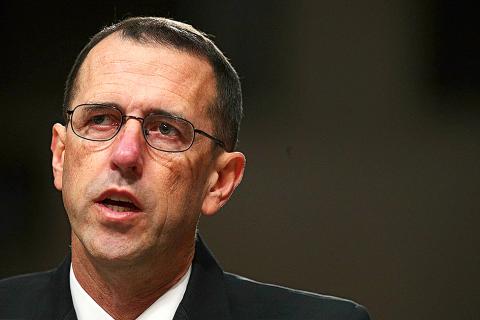A top US Navy admiral has announced the re-establishment of the US 2nd Fleet — a Cold War command disbanded in 2011 — to patrol the North Atlantic and face a resurgent threat from Russia.
The chief of US Naval Operations, Admiral John Richardson, made the announcement during a change of command ceremony on Friday in the naval port of Norfolk, Virginia.
“Our National Defense Strategy makes clear that we’re back in an era of great power competition as the security environment continues to grow more challenging and complex,” Richardson said, according to a US Navy statement. “That’s why today, we’re standing up Second Fleet to address these changes, particularly in the north Atlantic.”

Photo: AFP
The 2nd Fleet command was disbanded as a cost-savings step in 2011, and its assets and personnel dispersed within the navy.
The new command will be responsible for US naval forces along the US east coast as well as the north Atlantic region, a statement said.
Before it was disbanded the 2nd Fleet played a key role during the Cold War years, with operations in the North Atlantic and supporting US naval forces in the Mediterranean.
Russian planes and ships have in recent months made multiple incursions in the north Atlantic close to the airspace and territorial waters of US NATO allies, including Britain.
NATO naval officials late last year also reported Russian submarines probing undersea data cables in the north Atlantic.
The 2nd Fleet command currently exists only on paper, but according to USNI News, a publication of the US Naval Institute, the command is scheduled to open for business on July 1 with 11 officers and four enlisted personnel.
The command will eventually grow to 256 personnel — 85 officers, 164 enlisted and seven civilians — USNI reported, citing a memo signed earlier in the week by US Secretary of the Navy Richard Spencer.
The decision to reactivate the 2nd Fleet followed increasing threats in the Atlantic from Russia, officials familiar with the decision told USNI News.
US Secretary of Defense James Mattis in January said the US is facing “growing threats” from China and Russia, and warned that the US military’s advantages have eroded in recent years.
“We face growing threats from revisionist powers as different as China and Russia, nations that seek to create a world consistent with their authoritarian models,” Mattis said as he unveiled the Pentagon’s latest National Defense Strategy.
“Our military is still strong, yet our competitive edge has eroded in every domain of warfare,” he added.

The CIA has a message for Chinese government officials worried about their place in Chinese President Xi Jinping’s (習近平) government: Come work with us. The agency released two Mandarin-language videos on social media on Thursday inviting disgruntled officials to contact the CIA. The recruitment videos posted on YouTube and X racked up more than 5 million views combined in their first day. The outreach comes as CIA Director John Ratcliffe has vowed to boost the agency’s use of intelligence from human sources and its focus on China, which has recently targeted US officials with its own espionage operations. The videos are “aimed at

STEADFAST FRIEND: The bills encourage increased Taiwan-US engagement and address China’s distortion of UN Resolution 2758 to isolate Taiwan internationally The Presidential Office yesterday thanked the US House of Representatives for unanimously passing two Taiwan-related bills highlighting its solid support for Taiwan’s democracy and global participation, and for deepening bilateral relations. One of the bills, the Taiwan Assurance Implementation Act, requires the US Department of State to periodically review its guidelines for engagement with Taiwan, and report to the US Congress on the guidelines and plans to lift self-imposed limitations on US-Taiwan engagement. The other bill is the Taiwan International Solidarity Act, which clarifies that UN Resolution 2758 does not address the issue of the representation of Taiwan or its people in

US Indo-Pacific Commander Admiral Samuel Paparo on Friday expressed concern over the rate at which China is diversifying its military exercises, the Financial Times (FT) reported on Saturday. “The rates of change on the depth and breadth of their exercises is the one non-linear effect that I’ve seen in the last year that wakes me up at night or keeps me up at night,” Paparo was quoted by FT as saying while attending the annual Sedona Forum at the McCain Institute in Arizona. Paparo also expressed concern over the speed with which China was expanding its military. While the US

SHIFT: Taiwan’s better-than-expected first-quarter GDP and signs of weakness in the US have driven global capital back to emerging markets, the central bank head said The central bank yesterday blamed market speculation for the steep rise in the local currency, and urged exporters and financial institutions to stay calm and stop panic sell-offs to avoid hurting their own profitability. The nation’s top monetary policymaker said that it would step in, if necessary, to maintain order and stability in the foreign exchange market. The remarks came as the NT dollar yesterday closed up NT$0.919 to NT$30.145 against the US dollar in Taipei trading, after rising as high as NT$29.59 in intraday trading. The local currency has surged 5.85 percent against the greenback over the past two sessions, central